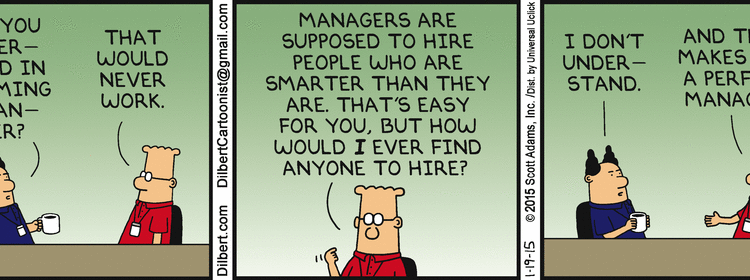While I was reading the book “The Making of a Manager” from Julie Zhuo, she shared an experience that reminded me of a previous and similar experience. So I decided to write about what means to be a manager or to move or promote to a manager position. I also would like to recommend her book.
Returning to the book and the experience, Julie shared that while she was managing a team, the team expanded, and this growth made it possible to promote a team member into a manager position. She thought on her best designer, the most experienced, who was usually the one in which the team relied on, made questions, and had all the trust from the teammates.
That person answered with a yes, and it was promoted to manager. And what happened next was that after a year quit the job. Literally from the book, she said that “every morning as she lay on the bed, she dreaded the prospect of going to work an managing people”.
In the end, she wasn’t passionate about her new job responsibilities, and in time she got burned and couldn’t find the motivation to continue. She was a maker, a problem solver, and doesn’t want manager duties.
Personal experience
In my personal experience, something similar happened, but with a happier ending. Some years ago, while I was managing a team, I used to have one of the senior team members as a backup. Then, due to growth or reorganization, don’t remember exactly, there was a place for one promotion to team lead. Based on experience, and the long time that he did as a backup, I recommended him for this position.
My surprise was that he didn’t get the job, and that the position was filled with another colleague who hadn’t any experience, and that in my opinion wasn’t the best option at that moment. So I went to ask my boss what happened. I had different arguments to demonstrate that my proposal was the best.
The answer was that he rejected the offer. I was shocked. He had been my backup, and before me, he was too. And at first I didn’t understand this decision. So, I went to talk to him, and he shared very clearly that he appreciated the offer but if possible he preferred to continue through a more technical path, didn’t want to move to management.
I also remember a different experience that took place later, in another company, where we decided to promote a colleague who was asking for more responsibilities, looking for another challenge. We considered him because he had the experience, also had managed teams in the past, had the mood, good relationship with the same department mates, but also from other areas. Everything seemed to be perfect.
This time, as happened in Julie’s story, this colleague left the company. Again, I was surprised by this decision. This person realized that this position wasn’t for him, that it wasn’t what he was looking for.
Learnings from this experiences
The first learning was that, in the first case, I never asked him. I only assumed that as always had been my back up, he would be interested in the position, and I was completely wrong.
The second from the same experience would be that not everybody is interested to promote into management positions. I have always defended this point. In Spain, it is very common to think that the only way to grow is by moving into management. But if you’re good at anything and you enjoy doing your job, you shouldn’t be suggested to change.
Changing to the following experience, third learning would be that even if the conditions seem to be the appropriate, shit happens. It could happen that it doesn’t work. Sometimes we look for new challenges, or new responsibilities, but we are not prepared or maybe it is not the right decision. We are humans and we all fail.
My fourth learning is about follow up. In this particular case, probably the ending would have been the same. But we should have identified the problem earlier, maybe we should have seen the signals. When somebody is promoted, even if he had demonstrable experience in the field, it is recommended to accompany the first months to help to introduce the position and new responsibilities. I am pretty sure that we did, but I somehow think that we failed this person, and it is always bad to see leaving a good colleague.
Questions to answer before being a manager
Are you planning to move or promote to a management position? Before doing it, I recommend you to think about the following questions or topics.
First, managing a team is about thinking based on the team. Your outcome will be the team’s, and you’ll be reviewed based on its performance. So, are you a team player? You’ll have to find your motivation inside achieving team goals, not any particular goal.
If you like doing, thinking, and solving problems or challenges on your own, probably you prefer to continue like this. Don’t get me wrong, everybody likes to solve problems and challenges, but as a manager, you have to prioritize the team over any personal tasks. If you focus on personal tasks, you won’t probably dedicate enough time to the team.
Second, you have to enjoy people. What does it means? Managing a group of humans means that you’ll have to talk to them, listen to them, do the effort to understand them. You will have to be accessible to your team. You could organize meetings, but if any problems arise, you have to be there, because their problems are yours.
Ok, I agree that sharing time and interacting with people doesn’t mean friendship, but you have to build a strong relationship, at least based on trust. And if you are unable to show any kind of empathy, think about it twice before moving to a management position.

Third, be prepared to give service. What does it mean? As a manager you’re responsible for an outcome, there are customers (other managers, sponsors, stakeholders, etc) waiting or depending on your work, and sometimes it is a very visible outcome (lots of eyes over you). You have to be service-oriented and customer-oriented. Also, as a servant leader, you could see your team as another type of customer too, with different needs.
There’s a motto that says that “Customer is always right”. Think about it as a constant truth, always try to understand your customer’s point of view, and if your customer is not right, you have to turn it over doing the right questions, with patience and intelligence. It is important to build a strong and trusting relationship with all your customers.
Forth, and less usual, you have to be prepared for new amazing topics like politics and diplomacy. I hope it is not the usual, but I have experienced it many times, maybe I had bad luck. People from other teams, departments, areas, management levels, have different interests, and in environments where not all the people work towards a common purpose or interest, you could see strange behavior. You’ll always find people more interested in earning medals to get promoted. Be patient, be transparent, communicate properly, and focus on your outcomes.
Additional questions
It is important to know the tradeoffs of being a manager. But also it is good to clarify your intentions, your personal goals, or why are you willing to move to a management position.
If you want to be a manager because it is the way to promote, you should again think about it twice. Read again the last questions about what a manager is about, and think about what kind of job fills you. If doing or solving problems it what makes you happy, you should see if there’s any other career track that maybe will suit better your expectations.
Maybe you are looking for increased earnings. If money rules your world and you’re ok with the questions mentioned before, and you focus on your team and outcome, it shouldn’t be a problem. Consider that maybe you won’t build strong and trusting relationships based on money. And please also consider that if you don’t enjoy what you’re doing, you won’t last in the position.
Another possibility is that you are looking for recognition, for any kind of reward. Then remember that as a manager, your team success is your success, as it will be for your manager. This is how it is measured by your outcome. If you like the feeling of being you who face a challenge and solves it, being a manager you won’t develop anything alone. Maybe if you have any kind of issue regarding your work and how it is recognized, then you should share this with your manager before.
As a general advice, no matter your goals or expectations are, talk to your manager about them. Ask for guidance. A manager with experience not only in his background but knowledge about the company you both work for will help you to set clear expectations and goals, and will probably answer all your questions about this next step you are thinking about.

Do whatever it makes you happy
Being a manager is sometimes (and IMHO wrongly) seen as a promotion, or as the path to achieve more recognition, more rewards, compensations, etc. But what are your ambitions and goals? What are the sources of your happiness?
If you ask yourself “what is your goal”, and after you answer yourself you continue asking “why” enough times, you’ll probably find that everything you do, whatever you are pursuing, you do it because you believe it will make you happier.
The question then for you to ask yourself is whether what you think you want to pursue will get you the happiness you think it will get you.
I would appreciate it if you do have any experiences from your manager transition, or experiences as a manager, that you would like to also share with me. All these experiences are gold!
I hope you liked it. If so, please share it! Do not hesitate to add your comments. And, if you want to stay up to date, don’t miss my free newsletter.
Thanks for reading.
